| Article ID | Journal | Published Year | Pages | File Type |
|---|---|---|---|---|
| 6051769 | Archives of Oral Biology | 2013 | 7 Pages |
ObjectiveThe effect of experimental jaw-muscle pain and stress on masticatory muscle activity in TMD-patients has been discussed. Furthermore, associations between TMD and deep bite patients have been studied. Accordingly in the present study, comparison of EMG responses at rest, maximal clenching, during evoked pain and stress between deep bite patients and controls was investigated.DesignIn 30 deep bite patients and in 30 sex-/age-matched controls with neutral occlusion EMG activity was recorded bilaterally from masseter and anterior temporalis muscles before and during evoked pain and before and during a stress task. Evoked pain was induced by injections of glutamate into the masseter (local pain) and brachioradialis (remote pain) muscles and resting EMG activity was recorded before and after 1, 2, 3, 4, 5 and 10Â min. A precision task was used to simulate a stressful condition and EMG activity was recorded twice during the task. Maximal EMG activity was recorded during maximal clenching.ResultsResting and maximal EMG activity were significantly different between groups and age with no gender differences. EMG activity during local pain and during the precision task were significantly different between groups, gender, age and time, whereas no time effect was found for the EMG activity during remote pain.ConclusionsPatients with deep bite have significantly different jaw motor responses to painful stimulation of the trigeminal region and manual precision tasks suggesting a differential integration of both somatosensory and behavioural stimuli.
